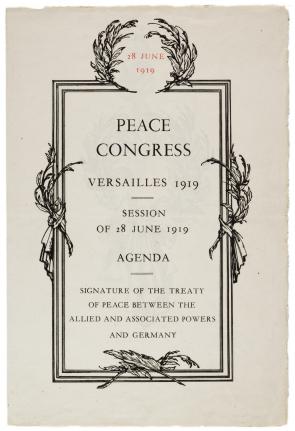Treaty of Versailles and President Wilson, 1919 and 1921
A Spotlight on a Primary Source by the Paris Peace Conference and William Gibbs McAdoo
 The Treaty of Versailles, which ended World War I, was drafted at the Paris Peace Conference in the spring of 1919 and shaped by the Big Four powers—Great Britain, France, Italy, and the United States. This souvenir copy of the Paris Peace Conference program is signed by President Woodrow Wilson and other world leaders.
The Treaty of Versailles, which ended World War I, was drafted at the Paris Peace Conference in the spring of 1919 and shaped by the Big Four powers—Great Britain, France, Italy, and the United States. This souvenir copy of the Paris Peace Conference program is signed by President Woodrow Wilson and other world leaders.
The treaty would largely come to be seen as a failure for Wilson, however. Congress, concerned about conceding individual power in order to become a member of the League of Nations, refused to ratify it. Wilson had been the driving force behind the League of Nations, and while the other signatories of the treaty embraced the League, American isolationism quashed enthusiasm for it at home. This press statement, released as Wilson left office in 1921 by William Gibbs McAdoo—who was both Wilson’s son-in-law and his treasury secretary—defends the President’s handling of the Treaty of Versailles. McAdoo argued that Wilson had "laid the foundations of world peace and a new order" and made a "matchless contribution to his time" in the treaty. "Whatever may be the imperfections of the Treaty from a political or economic standpoint," McAdoo wrote, "Woodrow Wilson did not fail."
A full transcript is available.
Excerpt
I do not agree with those who hastily and inconsiderately adjudge the President’s work at the Peace Conference a failure. Whatever may be the imperfections of the Treaty from a political or economic standpoint, Woodrow Wilson did not fail. The outstanding thing for which he fought, the thing that transcends political and economic considerations, is the permanent peace of the world. Unless this is secured all else is failure; without this the sublimest hope of humanity is sunk in the black abyss; without this all political and economic adjustments are unstable and sooner or later will disappear.
